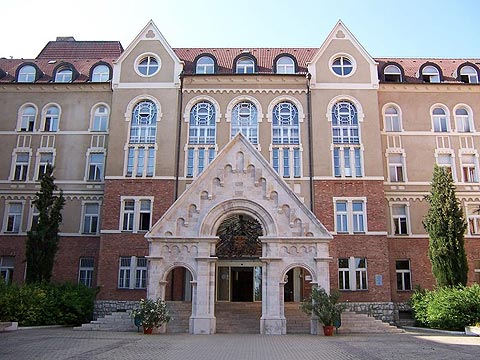Explaining the phenomenon of Hungary
Only a mere 10 million people but now Hungary has more than 15 Nobel laureates. This is also the country with the highest average Nobel laureate in the world.
At the seminar, the book 'Hungarians and Nobel Prizes' was just held at the Vietnam Union of Science and Technology Associations (VUSTA), many Vietnamese scientists said that ' difficult language and background Advanced education, a mix of civilizations . ' are the things that have made this country a success.
Small country 'takes' many big prizes
Hungary covers an area of 93,000 square kilometers, accounting for only 1% of Europe with a population of about 10 million people. Yet after only five years of the Nobel prize being held, the Hungarians contributed.
The Hungarians first enrolled in the Nobel Prize honor podium Lénárd Fülöp in Physics (1905). Since then, in 2004, the country continued to "win" 14 more Nobel prizes.
Not to mention, the highest award for Fields mathematics also recorded 8 Hungarian faces in their annual award history. Besides, there are many award-winning Hungarian scientists awarded by the US and the Royal Family.

Pecs is the first university, founded in 1367, is also the largest university of Hungary today.
Currently, President of the World Mathematical Society, Prof. Dr. Lovász László is also a Hungarian; The George Pólya Prize, the grand prize for combinatorial math researchers, also bears the name of a mathematician, the eminent educator of this country: Pólya György.
Keeping track of the history of the Nobel Prize will find that for every 10 years, the Nobel Prize belongs to a Hungarian person. In 1994 and 2004 alone, two Hungarians each year received this noble honor.
Success thanks to the philosophy of education
Explaining why a country is on the side of losing the war in both the first and second world wars and then being divided into five, having seven such scientific achievements, Dr. Giap Van Chung (translator of the book The Hungarians who won the Nobel Prize in Vietnamese) said that: 'The language, the unusual history and the special education policy are the foundation of the Hungary's wonders'.
According to Dr. Chung, the logic of language can influence the thinking of people. And the Hungarian language is the hardest in the world. The official language in Hungary is Hungarian, also known as Magyar - a Finno-Ugric language that is closely related to Finnish and Estonian.
Hungarian is a non-Indo-European language. 'This is a language that when you say both hemispheres must work at the same time , ' said Dr. Chung.
In an ethnographic perspective, Dr. Dinh Hoang Thang, former lecturer of the Institute of International Relations, said that to have a country like Hungary today, the people had to go through the "divine" migration throughout. 500 years.
People from remote plains of Asia have affirmed themselves in the center of Europe. But it is worth noting that, before they came and stayed here, there were many tribes, many of whom had to surrender, were destroyed in this very land. 'In addition to the resilience and intense vitality, the mixture of both Eastern and Western civilizations also creates extraordinary Hungarian people ,' said Dr. Dinh Hoang Thang.
But most of all, Hungary is recognized as an early country with an advanced education. From the end of the 19th century, after attaining the Austro-Hungarian Peace Treaty in 1867, the Hungarian government established councils to study the education of advanced neighboring countries such as Germany, France, Austria . to find the best education policy for our country.
What makes Dr. Giap Van Chung pay special attention is the Hungarian philosophy of education: To create independent people in thinking. Up to now, there is an intimate network of education links between levels in Hungary. A talent discovered at the secondary level can be sent directly to higher education levels such as university and graduate school.
- Hungary may be a source of radioactive emissions in Europe
- Hungary prepared the vaccine against H5N1 virus
- Explaining the phenomenon of 'ice hair' fantasy is extremely rare when the temperature drops deeply
- Hungary: Discovering mammoth elephant fossils
- Hypothesis explaining the phenomenon of shivering after urinating in men?
- Hungary warns of bird flu
- Explaining the phenomenon of the piece of buffalo meat makes the netizens dead
- Explaining the phenomenon of the hideous Pig in Cannock Chase forest
- Hungary: Discover an ancient forest of 8 million years old
- Hungarian bauxite waste threatens wide-area pollution
- Mud poison spills into the second longest river in Europe
- Barriers to Mongolian horse horses flooded into Europe
 The most famous scientific failures in history
The most famous scientific failures in history Mysterious genius mechanic and the machine froze time
Mysterious genius mechanic and the machine froze time The son carries the 'bad gene' of genius Albert Einstein
The son carries the 'bad gene' of genius Albert Einstein Isaac Newton
Isaac Newton